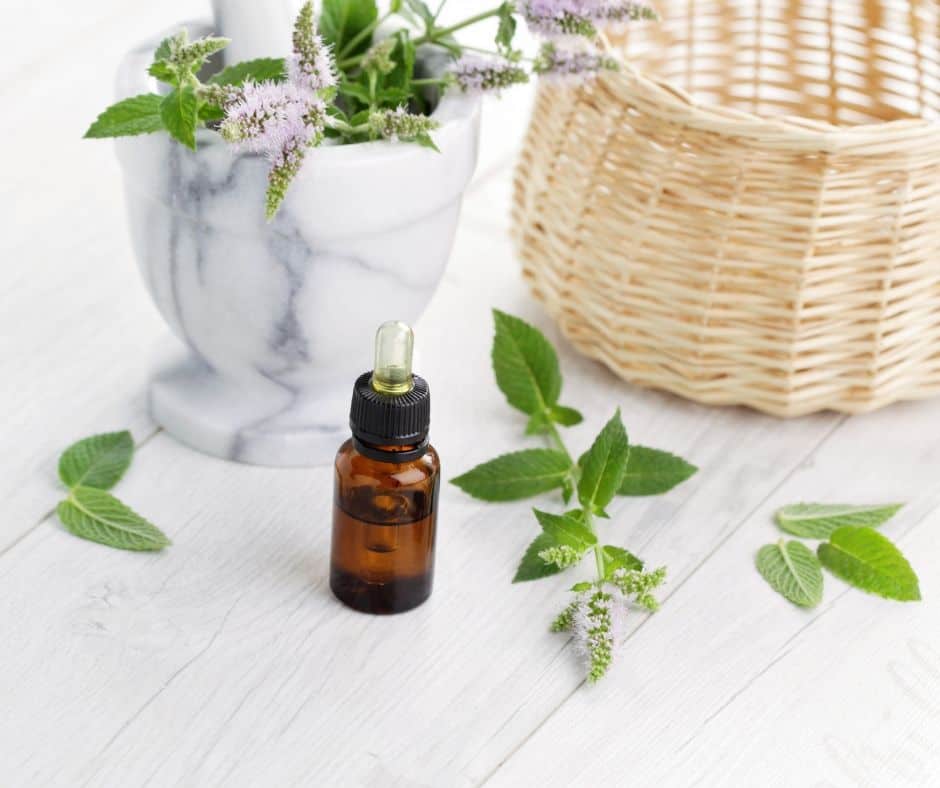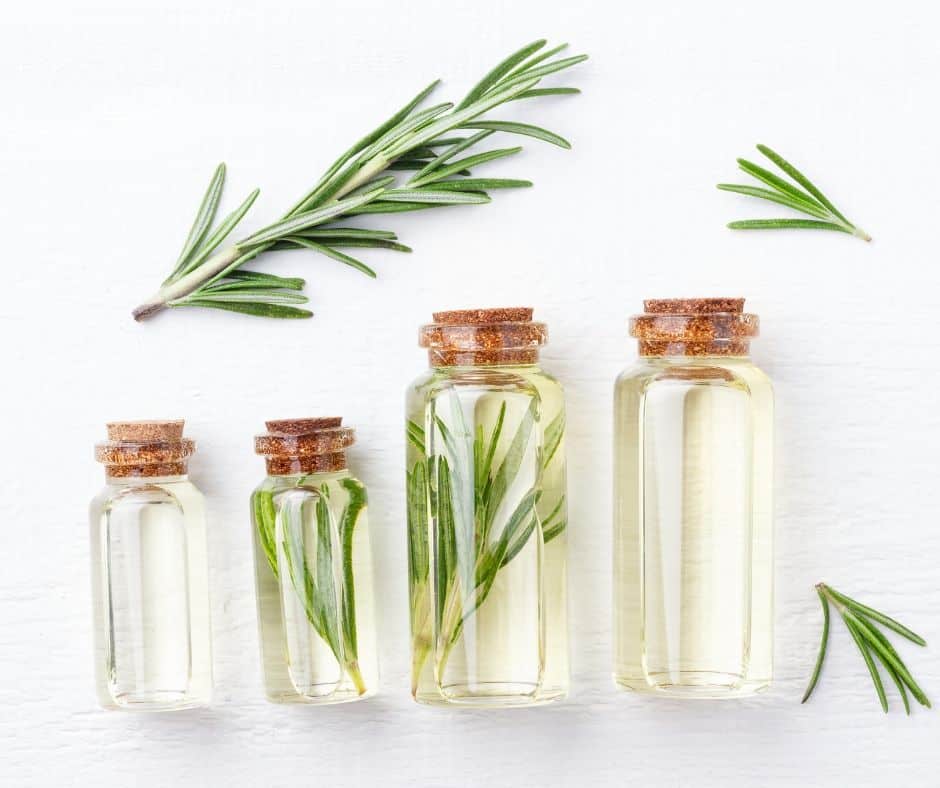Quick Answer: Best Essential Oils for Cough and Cold
1. Eucalyptus Oil
2. Rosemary Oil
3. Geranium Oil
4. Tea tree Oil
5. Camphor oil
6. Frankincense Oil
7. Peppermint Oil
As the name suggests the common cold is indeed common, on an average an adult may experience the common cold around 2-3 times a year.
The common cold can be caused by more than several 100 viruses and does not last for longer than 7-10 days. [1]
An adult may experience 2 to 3 episodes of the common cold per year. [2]
For most cases of cold rest and consuming fluids to stay hydrated is recommended. [3]
Some of the symptoms include a runny nose, nasal congestion, sore throat, along with a headache and cough. [4]
Using a hand sanitizer and avoiding close contact with others during a cold can prevent its spread to others.
Some of the available treatments for cough and cold include steam inhalation, acetaminophen can be taken in case of a fever or headache. [5]
Dextromethorphan is helpful for a cough. [6]
These medications may have side effects such as drowsiness and can affect productivity at work if taken during the day. [7]
Contrary to popular belief cold treatment doesn’t need antibiotics. [8]
As most colds are caused by viruses and irrational use can later lead to antibiotic resistance.
Most common colds can easily be managed with the use of home remedies such as steam, lozenges for cough and nasal sprays for nasal stuffiness. [9]
Essential oils are a great way to manage the common cold and cough.
What are Essential Oils?
Essential oils are the oils extracted from plants or parts of plants such as fruit, flower or leaves that contain the essence of the plant hence the name eg: Chamomile oil.
They are widely used in aromatherapy.
Carrier oils are the fixed oils which are used to carry or dilute the essential oils eg: Castor oil
Plant-based volatile oils which have the aroma characteristic of the plant are called essential oils. [10]
Essential oils for a major part of aromatherapy where aromas are used to achieve a therapeutic response. [11]
Aromatherapy is one of the widely used complementary therapies for treating various disorders. [12] The essential oil can be applied or massaged into the skin, inhalation or dispersed in water. [13]
Some examples of essential oils are lavender, cedarwood, tea tree, citronella oil etc. The essential oils are highly concentrated and therefore need to be diluted before use.
The essential oils are diluted in fixed vegetable oils known as carrier oils. Examples of carrier oils are jojoba oil and sweet almond oil.
How Essential Oils help in Cough and Cold?

Yes, essential oils can help in cough and cold in several ways. Essential oils such as eucalyptus, camphor, rosemary, and tea tree oil are well known for their benefits in managing coughs and colds.
They have antitussive, bronchodilatory, decongestant, expectorant, antimicrobial and mucolytic actions.
1. Bronchodilatory Effects
A study conducted found that essential oils extracted from Blepharocalyx salicifolius when tested on receptor models showed anti-tussive (prevent cough) and bronchodilating effects which may be useful in person with cough and cold.[14]
2. Decongestant and Expectorant Action
Eucalyptus oil is found in many over the counter (OTC) medications and is known for its decongestant and expectorant properties. [15] Camphor is a more suitable anti-tussive agent for children as it is less likely to cause toxicity [16].
3. Antimicrobial Properties
Tea tree oil is recommended as in has broad spectrum antibacterial, antiviral and antifungal properties and is useful in respiratory disorder with breathing difficulties. [17]
4. Possesses Mucolytic Action
Cineole which is a compound found in rosemary oil can help breakdown nasal mucus which is useful in case of nasal stuffiness and chest congestion. [18]
5. Helps in Relaxation of Respiratory Muscles
Peppermint oil can help to relax the muscles of the windpipe and prevent throat irritation which can lead to worsening of cough. [19]
Frankincense oil has been widely used in the treatment of cough. [20]
Thus essential oils can act in multiple ways to manage cough and cold such as antitussive, bronchodilation, decongestant, mucolytic and antimicrobial properties.
What are the Best Essential oils for Cough and Cold?

There are several essential oils which are highly beneficial in taking care of a cough and cold. They can relieve symptoms of runny nose, chest congestion, nasal stuffiness, cough, and sore throat through their varied mechanisms of action. Some of them include eucalyptus, camphor, tea tree, rosemary, geranium oil to name a few.
1. Eucalyptus Oil
The oil is well known for its benefits in getting rid of a cough and its expectorant properties.
A study was conducted to assess the effects of vapor rub which contains eucalyptus oil vs petrolatum for children with nocturnal cough and cold symptoms and they found the vapor rub to be far superior and more effective in reducing cough severity as well as difficulty in sleeping. [21]
2. Rosemary Oil
Rosemary oil is known to relax the muscles of the trachea which can help during severe coughing bouts. Due to its relaxant effects, it is also been used in patients with asthma where bronchospasm can lead to breathing problems. [22]
3. Geranium Oil
A study found that geranium oil can relieve cough symptoms. [23] Another study found that administration of liquid drops of geranium as a herbal preparation can relieve symptoms of common cold, shorten the duration of the illness and was well tolerated by patients. [24]
4. Tea tree Oil
Most common colds are caused by viruses. Tea tree oil is known to have antiviral properties and its use may help to shorten the colds and flu and alleviate most symptoms of the illness. [25]
5. Camphor oil
Camphor oil has been used as a remedy for coughs and colds since ancient times. A study has shown that camphor oil can relieve symptoms of cough and cold especially nasal decongestion ad it acts on TRPV1 receptors which are responsible for the body’s sensation of heat. [26]
It has anti-inflammatory properties which can be beneficial in colds and inhalation of the vapors may relieve cough as well.
6. Frankincense Oil
The common cold and flu are caused by the influenza virus. The oil has protective effects through anti-inflammatory and immune modulation against the influenza virus. [27]
Frankincense is also known to have expectorant properties which means that it can help expel mucus trapped within the respiratory tract and relieve nasal congestion. [28]
7. Peppermint Oil
Peppermint oil contains menthol. Menthol is often found in cough lozenges and used to relieve a sore throat.
A study conducted in school children found that although peppermint oil way not relieve nasal symptoms it can help in maintaining nasal patency and the children felt better. [29]
How to use Essential Oils for Cough and Cold?

There are several ways essential oils can be used to provide relief from cough and cold.
Essential oils can be used either topically by applying on the chest, through inhalation using steam, or placing a handkerchief with a few drops of oil on it and inhaling as well as by consuming lozenges containing peppermint oil which has menthol to relieve a sore throat.
They can also be placed in a diffuser and allow the oils to diffuse through the room.
A few drops of eucalyptus oil can be added to an ounce of carrier oil and the mixture rubbed on the chest or a few drops may be placed in boiling water and the steam inhaled. [30]
Many vapor rubs available in stores also contain eucalyptus oil.
Peppermint oil has a cooling effect when inhaled and hence it can be added to boiling water and the steam inhaled.[31]
For a runny nose, a cup of Thieves tea can be had every two hours. It can be prepared by adding 4 drops of the Thieves oil to 1 tsp of soy milk and hot water with agave or stevia as a sweetener.
Symptoms will be relieved within 48 hours.[32]
Inhaling tea tree oil can relieve the symptoms of a cough as well. [33]
Essential oils can be used with the help of a diffuser or by adding to steam water and inhaling or mixing with carrier oils such as grapeseed oil and applying topically to the forehead and chest.
Essential oils shouldn’t be inhaled directly from the bottle because of their potency.
Cold can also be prevented by drinking a glass of water containing 1 drop of Thieves oil daily during the cold season. [34]
Which are the Best Essential Oils for Kids Cough and Cold?

Some of the best essential oils for cough and cold in children are camphor, lemon, ginger, lavender, and oregano oils.
Eucalyptus and peppermint oils should be used with caution and care in smaller children as they are highly potent and there is a potential for toxicity.
Camphor is a suitable anti-tussive agent for children as it is less likely to cause toxicity. [35] While Eucalyptus oil has the potential to cause toxicity in children and therefore it should be used with care.[36]
Peppermint oil should not be used in very young children (less than 8 years) because of the potential for toxicity. [37]
Lavender, oregano, lemon and ginger essential oils may also be beneficial for children with cough and cold. [38]
There is limited information available on the safety of using essential oils for cough and cold in children and hence should be done with caution.
What are the Precautions when using Essential Oils for Cough and Cold?

There are certain precautions that have to be followed when using essential oils for cold and cough, mainly to use it with a carrier oil or diffuser to avoid toxicity due to its potency as well as a patch test before using the oil topically.
It is important not to use Eucalyptus and Peppermint oil in children less than 8 years old.
Essential oils should always be used with a carrier oil, as they are concentrated if used directly can damage the skin.
Also, it provides the added benefit of moisturizing the skin.
Use of essential oils in infants less than 6 months of age should be avoided and use with caution during pregnancy, asthma and epilepsy patients. [40]
Do not inhale essential oils directly from the bottle due to their potency.
Peppermint and Eucalyptus essential oils shouldn’t be used in children less than 8 years old due to potential toxicity. [41]
After inhaling essential oils children should be asked to spit out the mucus or sputum that is expectorated.
Always use therapeutic grade essential oils.[42]
Always consult your physician or a qualified aromatherapist before using any essential oils [43]
Final Words
Essential oils are a great way to manage cold and cough in a side effect free manner if used correctly.
Some methods of using them can also be a prophylactic to prevent the development of cold and cough.
Essential oils have multiple ways of acting from bronchodilation to antitussive as well as mucolytic, expectorant and antimicrobial properties.
If used in the right way under the supervision of an aromatherapist the essential oils are a wonderful way of getting rid of the common cold and cough which everyone has experienced some time or the other in a safe and side effect free manner.
